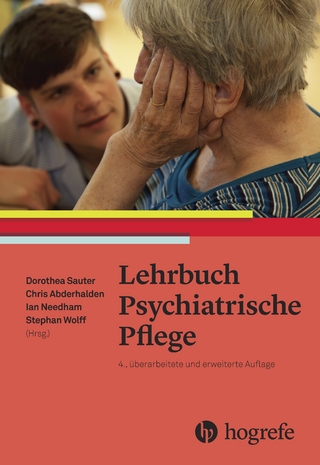
Cognitive-Behavioural Therapy
Research and Practice in Health and Social Care
Seiten
2011
|
2nd edition
Routledge (Verlag)
978-0-415-56436-6 (ISBN)
Routledge (Verlag)
978-0-415-56436-6 (ISBN)
Cognitive-Behavioural Therapy is written in a lively and accessible style and is designed to give a thorough grounding in cognitive-behavioural methods and their application. It is essential reading for students and professionals in social work, nursing and psychotherapy.
Cognitive-behavioural therapy (CBT) has been extensively researched and shown to be solidly underpinned by evidence. Broadly applicable across a wide range of personal and social problems – from depression and phobias to child behavioural problems – it is only now beginning to be used to its full potential in health and social care practice.
This second edition of Cognitive-Behavioural Therapy is comprehensively revised and updated. It takes into account the significant amount of new research in the discipline, and integrates theory, research and practice. The text includes plentiful case studies from across health and social care to illustrate particular approaches, different problems and different professional circumstances. Topics covered include:
a discussion of the development and distinctive features of CBT;
a comprehensive review of research on learning and cognition, examining the therapeutic implications of these studies;
a thorough guide to assessment and therapeutic procedures, including methods of evaluation;
illustrations of the main methods of helping with case examples from social work, nursing and psychotherapy;
consideration of the ethical implications of such methods as part of mainstream practice.
Cognitive-Behavioural Therapy is written in a lively and accessible style, and is designed to give a thorough grounding in cognitive-behavioural methods and their application. It is essential reading for students and professionals in psychology, social work, psychiatric nursing and psychotherapy.
Cognitive-behavioural therapy (CBT) has been extensively researched and shown to be solidly underpinned by evidence. Broadly applicable across a wide range of personal and social problems – from depression and phobias to child behavioural problems – it is only now beginning to be used to its full potential in health and social care practice.
This second edition of Cognitive-Behavioural Therapy is comprehensively revised and updated. It takes into account the significant amount of new research in the discipline, and integrates theory, research and practice. The text includes plentiful case studies from across health and social care to illustrate particular approaches, different problems and different professional circumstances. Topics covered include:
a discussion of the development and distinctive features of CBT;
a comprehensive review of research on learning and cognition, examining the therapeutic implications of these studies;
a thorough guide to assessment and therapeutic procedures, including methods of evaluation;
illustrations of the main methods of helping with case examples from social work, nursing and psychotherapy;
consideration of the ethical implications of such methods as part of mainstream practice.
Cognitive-Behavioural Therapy is written in a lively and accessible style, and is designed to give a thorough grounding in cognitive-behavioural methods and their application. It is essential reading for students and professionals in psychology, social work, psychiatric nursing and psychotherapy.
Brian Sheldon is Emeritus Professor of Applied Social Research at the University of Exeter, UK. A registered Cognitive Behavioural Therapist, he is also a qualified psychiatric nurse, a qualified social worker and holds a PhD in Psychology. He was previously Director of the Centre for Evidence-Based Social Services in the medical school at the University of Exeter.
1. Origins and Development of Cognitive-Behavioural Therapy 2. Research on the Effectiveness of Cognitive-Behavioural Therapy 3. Philosophical Implications 4. Learning Theory and Research 5. Emotional Reactions 6. Assessment, Monitoring and Evaluation 7. Stimulus-Control Techniques 8. Response-Control Techniques 9. Ethical Considerations
| Erscheint lt. Verlag | 12.1.2011 |
|---|---|
| Zusatzinfo | 9 Tables, black and white; 29 Illustrations, black and white |
| Verlagsort | London |
| Sprache | englisch |
| Maße | 174 x 246 mm |
| Gewicht | 660 g |
| Themenwelt | Sachbuch/Ratgeber ► Gesundheit / Leben / Psychologie |
| Geisteswissenschaften ► Psychologie ► Verhaltenstherapie | |
| Medizin / Pharmazie ► Gesundheitswesen | |
| Medizin / Pharmazie ► Medizinische Fachgebiete ► Psychiatrie / Psychotherapie | |
| Pflege ► Fachpflege ► Neurologie / Psychiatrie | |
| Sozialwissenschaften ► Pädagogik ► Sozialpädagogik | |
| Sozialwissenschaften ► Soziologie | |
| ISBN-10 | 0-415-56436-0 / 0415564360 |
| ISBN-13 | 978-0-415-56436-6 / 9780415564366 |
| Zustand | Neuware |
| Haben Sie eine Frage zum Produkt? |
Mehr entdecken
aus dem Bereich
aus dem Bereich
Buch | Spiralbindung (2024)
Urban & Fischer in Elsevier (Verlag)
34,00 €


